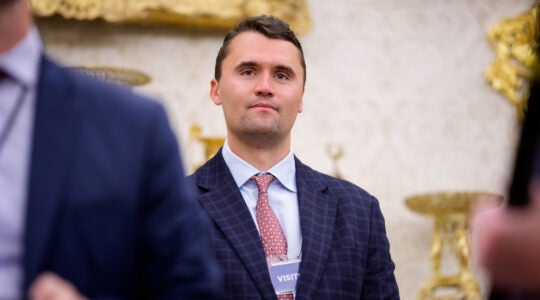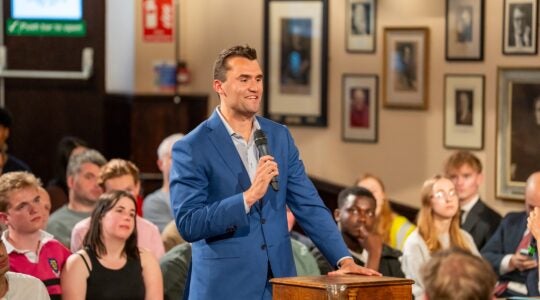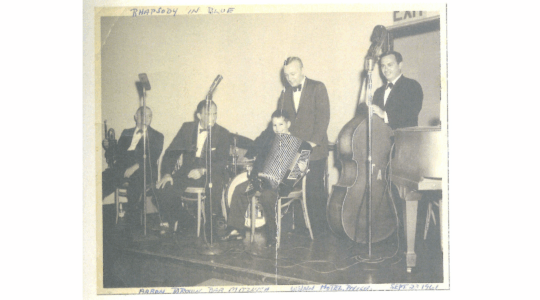SAN FRANCISCO (JTA) — Nobody thought much about the shabby but quiet middle-aged man who showed up last weekend at an Orthodox study hall in suburban Cleveland.
But when police came Monday and arrested the man, Ron Hirsch, 60, on charges of setting off a bomb next to the Chabad synagogue in Santa Monica, Calif., it sent shock waves throughout the Jewish community.
It also raised the question of how Jewish institutions should balance openness with security.
“You want people to feel safe, but still welcome,” said Howard Lesner, executive director of Sinai Temple, a large Conservative congregation in Los Angeles.
Jewish institutions in the United States have beefed up security since 9/11, following the lead of Israeli embassies around the world as well as synagogues and Jewish centers in Europe and South America. But measures designed to thwart terrorists can make worshipers feel uncomfortable and newcomers unwelcome. No one wants to pray in a fortress, religious leaders say.
“It’s a dilemma we face every day,” said Rabbi Dovid Eliezrie, director of Chabad of Yorba Linda, Calif.
Cleveland-area Jews were particularly disturbed that Hirsch, a transient who often slept near the Santa Monica Chabad shul and asked for handouts at Jewish doors, sought out an Orthodox neighborhood when he fled Los Angeles for Ohio last Friday. Those interviewed surmised that Hirsch knew he would be welcomed as a fellow Jew, with few questions asked.
“He felt comfortable enough to come into a community that offered him shelter and offered him money because the Orthodox community is very hospitable and takes care of its own," Rabbi Sruly Wolf of Cleveland Heights told The Associated Press.
Churches traditionally have kept their doors unlocked round the clock on the principle that the house of God should be open to all, but few U.S. synagogues follow that practice over concerns about everything from petty vandalism and Torah thefts to anti-Semitic attacks.
At the same time, some rabbis fear that overdoing security will keep away precisely those unaffiliated Jews they want to attract.
“We should not send the message to a Jew that walking into the synagogue is dangerous,” Eliezrie told JTA.
A year ago, he said, half a dozen unfamiliar young men walked into his synagogue right before Saturday morning services. He went to the lobby to check them out — “I was welcoming, but wondering,” he recalls — and learned that they were being initiated into a Jewish fraternity and had to visit five Chabad centers on one Shabbat.
Eliezrie invited them in for kiddush and wouldn’t let them leave until they listened to his 6-year-old grandson pontificate on the weekly Torah portion.
“If I would have overreacted, I would have driven them away,” he said.
Eliezrie said metal detectors and security guards do more harm than good — but he’s in a quiet suburb. Those in the big city, where transients are more common, have more to worry about, he acknowledges.
At Sinai Temple, in the Westwood area of Los Angeles, visitors are screened, wanded and eyeballed by a bevy of security personnel. Members of the congregation get a special decal allowing them to park in the building’s secure parking lot. The temple employs a full-time security director and brings in nearly three dozen guards for High Holidays services that draw upward of 5,000 people.
“On Shabbat we have 1,000 people at services,” Lesner said. “More than half of them are not members. They’re all screened, but we do it in a dignified manner. I’ve never had anyone refuse and walk away.”
Temple Beth Sholom, a large Reform synagogue in Miami Beach, Fla., also runs a tight ship. The synagogue was rebuilt four years ago, and a perimeter wall of Jerusalem stone was constructed around the building.
“It looks very pretty, but we did it on purpose,” Rabbi Gary Glickstein said. “There is just one entrance, so we can control access.”
Glickstein said it has the optimal balance between security and openness.
Beginners’ services, also called learners’ minyans, are particularly confounding for security concerns because they are consciously trying to attract newcomers rather than congregants who know each other.
“Too much security and people get turned away,” said Rabbi Yitzchak Rosenbaum, associate director of the National Jewish Outreach Program, which sponsors services for unaffiliated Jews throughout the United States. “We have beginners’ services, so that means you have all kinds of strange people walking in.”
The key, he says, is to keep tight security outside and a discrete watchfulness inside.
“We have a committee of lay leaders who keep an eye out to make sure nothing untoward occurs,” Rosenbaum said.
In general, rabbis say, worshipers who seem suspicious have to be watched, but discretely, so they and everyone else in the room is unaware of the surveillance.
Eliezrie says no one would be denied access to the kiddush or not counted in a minyan because of such suspicions.
“A human being is a human being,” Eliezrie said, adding that he’s never had to ask someone to leave his synagogue. “I’m going to treat everyone with respect. I have to welcome him in and just wonder a little bit.”
JTA has documented Jewish history in real-time for over a century. Keep our journalism strong by joining us in supporting independent, award-winning reporting.





